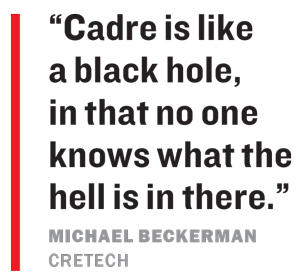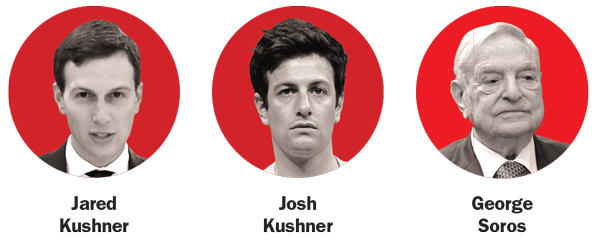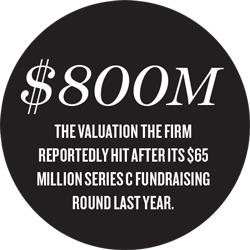Cadre’s official story — which its 30-year-old co-founder and CEO, Ryan Williams, rattles off with rehearsed precision — goes something like this:
Williams launched his first startup, selling wristbands and headbands in his native Louisiana, as a teenager and went on to graduate from Harvard in 2010. He then landed lucrative jobs at Goldman Sachs and the Blackstone Group until he realized that something just wasn’t right. Institutions and rich people could make fortunes buying and selling commercial properties, but middle-income Americans didn’t have the money or connections to do the same.
So, in late 2014, Williams left Blackstone and launched Cadre, an online platform where small-time investors can buy stakes in commercial assets the same way they’d buy anything else on the Internet.
Cadre went on to raise millions of dollars from investors. And Williams — Steve Jobs-like in his insistence on wearing the same style of crewneck sweater seemingly wherever he goes — became one of the most successful African-American CEOs in an industry in dire need of more diversity.
It’s an inspiring story. But it’s not the one Cadre is most associated with. It’s most famous for its other co-founder, Jared Kushner.
Last May, the Wall Street Journal reported that when Jared Kushner became a senior White House adviser to his father-in-law, Donald Trump, he omitted his stake in the company in federal disclosure forms. The potential for conflicts of interest — that Cadre investors or customers could use the startup to influence U.S. policy — has dogged the firm ever since.
When Bloomberg reported in May that SoftBank’s Vision Fund, which is backed by the Saudi Arabian government, was in talks to invest $100 million in Cadre, Jared Kushner’s stake and his involvement in Middle East policy were the story. SoftBank ultimately opted not to invest.
You can sense Williams’ frustration with all that.
During a CB Insights conference in Manhattan in June, Williams name-dropped investors Michael Fascitelli, SL Green Realty, the Ford Foundation and General Catalyst, but did not mention Jared Kushner — or his brother, Josh Kushner, who is also a co-founder.
 Williams declined to be interviewed for this story, in part, because he was concerned that it would be mostly about the Kushner connection, according to a source close to him. The Kushner obsession leaves Williams with a sizable hurdle: Not only does he have to convince skeptics that the four-year-old firm is here to stay, but he also has to convince them that he’s the one who deserves the credit for its success.
Williams declined to be interviewed for this story, in part, because he was concerned that it would be mostly about the Kushner connection, according to a source close to him. The Kushner obsession leaves Williams with a sizable hurdle: Not only does he have to convince skeptics that the four-year-old firm is here to stay, but he also has to convince them that he’s the one who deserves the credit for its success.
Fundraising feats
If a company’s success were measured purely in money raised, Cadre would have little left to prove. Last year, it raised $65 million in a Series C funding round led by esteemed venture capital firm Andreessen Horowitz, reportedly at an $800 million valuation.
In addition to Andreessen Horowitz, Cadre counts another Silicon Valley legend, Khosla Ventures, as an investor along with the above-mentioned real estate giants. And Fascitelli, the former CEO of Vornado Realty Trust, heads the company’s investment committee.
Although the SoftBank deal fell apart, Cadre does not appear to be facing a broader capital-raising problem.
According to Bloomberg, it’s been holding talks with other potential investors. One term sheet valued the company at $2 billion — more than twice its current valuation, the news outlet reported.
In addition, this past January, Cadre announced a partnership with Goldman Sachs — where Williams did a two-year stint — that would allow its wealth management clients to invest through the platform. The bank committed an initial $250 million from its clients to Cadre. Meanwhile, billionaire investor George Soros’ Soros Fund Management has given Cadre a $250 million line of credit and also owns a small stake in the firm, according to two sources familiar with the deal. A spokesperson for Soros did not respond to a request for comment.
That large pot of money sets Cadre apart from other real estate crowdfunding companies, reassuring developers that the firm can follow through on its funding commitments, sources said.
“It gives them time,” said mortgage broker Ayush Kapahi of HKS Capital Partners. “Those who didn’t have the [financial] backstop sort of went out of business.”
Williams was mum for this story, but last year, he told TRD that the firm had closed nearly $1 billion in transactions — though it’s unclear how much equity Cadre actually raised for those deals.
Like other firms in the crowdfunding space, Cadre took the age-old practice of syndication — developers raising money from dozens of investors — and moved it online. Cadre also offers portfolio investments similar to private equity funds, but with lower fees. (While most private equity firms charge asset management fees and a share of profits, Cadre reportedly charges a one-time fee for the investment and what it claims is a low subscription fee.) The firm tries to differentiate itself by offering the developers it invests with more independent decision-making leeway, according to sources close to the company. One developer who has partnered with Cadre said the company’s operating agreements are “less onerous” than those of some large private equity firms.
“There’s a lot of partners who truly do micromanage,” the source said. “Cadre picks partners that know what they’re doing and, as a result, they’re willing to be less strict.”

But Cadre — which invests directly in deals and then passes on most of its stake to its users — has been notably quiet about its real estate investments.
It invested in Kushner Companies’ acquisition of a four-building multifamily portfolio in Astoria, Queens, in January 2015. Filings with the U.S. Securities and Exchange Commission show that the total offering amount on the property was $15.2 million and that Cadre would receive $500,000 in sales commissions. It isn’t clear how much the company actually raised for the deal.
Sources told TRD that the company also wrote a $20 million equity check in 2016 to fund real estate investment firm JMC Holdings for its $51.5 million purchase of an office building at 411 West Putnam Avenue in Greenwich, Connecticut.
With the exception of the Astoria deal, the firm has not disclosed any of its transactions.
“Cadre is like a black hole, in that no one knows what the hell is in there,” said Michael Beckerman, head of the real estate tech research, networking and event company CREtech, although he added that he “wouldn’t bet against them or their investors.”
As a private company, Cadre isn’t required to publicly disclose its investments, but its secrecy stands in contrast to other crowdfunding platforms such as Fundrise and RealtyMogul, which have publicized some of their higher-profile investments.
For some, that lack of openness has led to skepticism.
“If these guys are transacting the way that I would hope they would, [they should] be extremely public about it,” said one venture investor, who has met with Williams. “Because the proof’s in the pudding, right? But nobody knows what they’re doing.”
While Cadre touts its tech, former employees and sources close to the firm say it underwrites its deals the way any real estate investment firm does: via analysts, not artificial intelligence.
Although the company is working on developing technology that will automate the investment process and lower the company’s costs, sources say it has yet to materialize.
The other thing, of course, that distinguishes Cadre from more traditional firms is that its customers can browse deals online and spend hundreds of thousands of dollars with the click of a button, through an online app.
But some expressed skepticism that investors would be willing to commit millions of dollars online.
“That is the million dollar question,” said Ashkan Zandieh, who runs the real estate tech research outfit RE:Tech.
An investor in the company, who asked to remain anonymous, dismissed that suggestion. “The high-net-worth people that are investing are used to making $50,000 to $100,000 bets frequently like that,” he said. “It’s not a large portion of their balance sheet that they’re putting at risk.”

And even if it is, he added, some investors may prefer to spend their money based on the abundance of information available through Cadre’s app. “I think the data speaks for itself,” he said. “I know what kind of car I want to buy and don’t need some salesman to tell me.”
Relationship business
While Williams has said that both Kushners have been “like brothers” to him, he has characterized Jared as less involved in Cadre.
“Every day, I speak with Josh Kushner. Josh, an investor through Thrive Capital, brings his tech domain expertise. He played an incredible role early on helping to seed us and give us the capital to build the business,” Williams told TRD last year. “Jared was an adviser and not involved operationally day-to-day. He was always a great sounding board for us.”
But sources close to the company say that’s not entirely true.
“Ryan was kind of running the day-to-day, but Jared was really calling the shots early on,” a former Cadre employee said on the condition of anonymity. “There’s been a little bit of rewriting of history.” A source close to Williams disputed that characterization.
While that narrative may be a little murky, what is clear is that Williams knew Josh Kushner from Harvard and that Josh later introduced him to Jared, who was CEO of the Kushner family’s real estate empire at the time.
The Kushner connection was crucial — at least at the beginning.
Although Cadre isn’t the only company to offer stakes in commercial properties online, its connections have helped propel it to the top of the pack.
All crowdfunding platforms face the same problem: “Sponsors with a good track record don’t have an issue raising capital,” said Travis Putnam, managing partner of real estate-centric VC firm Navitas Capital. The developers most likely to go to unproven startups are the ones that can’t get money elsewhere, and their deals tend to be less attractive.
Jared Kushner, who could convince big-time developers and investors to partner with Cadre, offered a solution to that problem. Early on, sources say, Kushner tapped his real estate acquaintances as investors.
But when Kushner got involved in Trump’s campaign, he started paying less attention to Cadre, according to sources, who noted that some employees and investors were not thrilled with the Trump association.
Soros and Kushner “probably made 100 introductions to Ryan,” a former Cadre employee said. “That created a lot of momentum for the business.”
And over the years, Williams built his own network. Notoriously disciplined — he claims to work from 8:30 a.m. to 1 a.m. with a five-minute salad lunch break — Williams told TRD last year that he holds 18 to 19 meetings a day.
A California-based investor in the company said he’s often able to reach Williams at 11 p.m. Pacific time — 2 a.m. in New York. “He works harder than anyone I’ve ever met,” the investor said.
Other sources close to Cadre say Williams excels at networking, but is less adept at managing employees. Though it’s not unusual for a startup, the company has lost several key executives since launching, including its chief technology officer, Jean Sini, who was terminated in April. A source close to Sini said at the time that he had been miffed about a lack of focus on technology. A Cadre spokesperson called that characterization “patently false.”
Starwood Capital veteran Marcos Alvarado, who joined as head of acquisitions in 2016, also left this winter and is now at iStar. Alvarado and Cadre both told TRD in May that he left for “personal family reasons.”
The secondary market
Andreessen Horowitz’s Jeff Jordan compares Cadre to Intercontinental Exchange, the commodity futures exchange firm that launched in 2000 and is now valued at more than $44 billion.
“Clearly,” the VC general partner wrote in a blog post explaining the firm’s Cadre investment, “the marketplace model can be successfully applied to large financial assets.”
Cadre’s fees are lower than those of private equity firms, and it offers more transparency, Jordan wrote in a reference to the information it provides potential investors. Cadre, he added, is also working on a product that offers investors on its platform the “potential for liquidity,” referring to Cadre’s plan to create a secondary investment market.
For years, the startup has been working on a platform that would allow investors to buy and sell stakes in buildings to each other. Today, anyone who invests in a traditional syndicate must wait for the sponsor to sell to get his money back. An investor in a private equity fund must wait until the fund’s term is up.
But if Williams succeeds, his users will be able to flip their investments to other Cadre members at any time — a reality that sources say would be revolutionary.
It would mean that stakes in private real estate could, for the first time, be traded like stocks or bonds. Some are skeptical that it can be done. For any secondary market to work, there must be enough investors participating.
“You create liquidity when you have a lot of standardization,” said Dan Miller, former president of Fundrise and head of the investment firm Myrtle Grove Ventures. “Everyone thinks it sounds like it could work, but it’s just a tough thing to do.”
In a May interview with the blog Financial Revolutionist, Williams acknowledged those obstacles. Building a secondary marketplace is “challenging,” he said, “given that the industry is relationship-driven.”
“But, we were driven to tackle this issue because there’s no real efficient solution from a liquidity standpoint in the industry today,” he added.
Williams is also looking to target tech company employees as investors. “There’s also a really exciting opportunity in the technology space itself with companies like Google and Facebook,” he said at the CB Insights conference. “We think there could be an opportunity marketing private products to their employees.”
Despite the lofty talk of democratizing real estate investment, however, Cadre is still heavily focused on raising money from wealthy families and institutional investors, according to sources close to the company.
According to one of the above-mentioned Cadre investors, it makes sense to first focus on the big spenders before targeting middle-income buyers.
“Like anything, when you get something started, you have to figure out who your initial market is. As you get to scale and perfect it, you can then spread it wider and wider,” the investor said.
“When the first flat-screen TV came out, it was $5,000, [and] very few could afford it,” he added. “Now, there’s really no not-flat-screen TV out there.”
In the longer term, Cadre is looking to add other investment opportunities to its suite of offerings.
Last year, Williams told TRD that he’s considering adding real estate debt to Cadre’s platform
“There’s a big opportunity to own the entire capital stack,” he said, noting that he wants his firm to eventually go beyond real estate to become the “preeminent global marketplace for alternative investments.”
